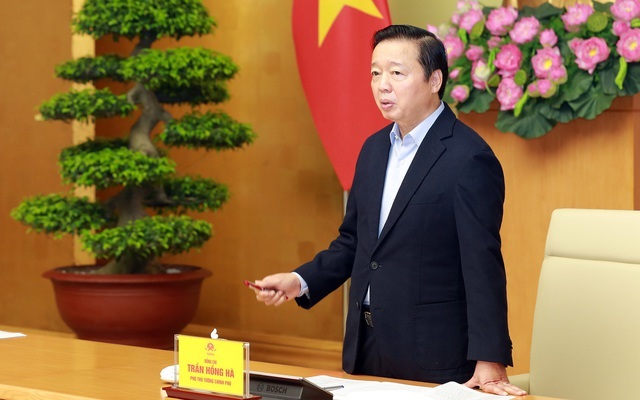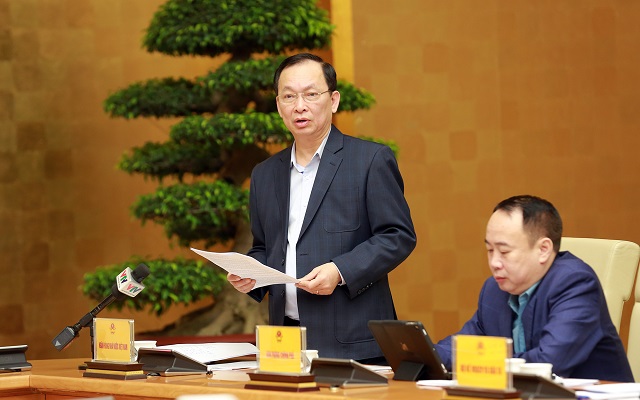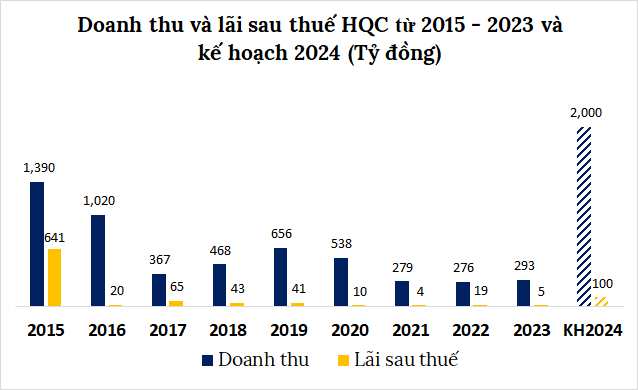Deputy Prime Minister Tran Hong Ha emphasized that the difficulties and obstacles in the real estate market have a serious impact on many industries such as banking, construction, building materials manufacturing, and consumer goods. Recently, the Government, the Prime Minister has been very interested, with many directions, meetings, and forums to receive opinions, find solutions to remove difficulties for the real estate market.

Deputy Prime Minister Tran Hong Ha: Resolving the recommendations of enterprises and localities must have specific addresses and deadlines. Which ministry, department is responsible, when is it completed? – Photo: VGP/Minh Khoi
|
The Government and the National Assembly have urgently amended relevant laws, preparing to issue guidelines. Besides, the “warming up” and optimism of the economy have also contributed to the positive development of the real estate market, thanks to the contributions of enterprises and real estate associations.
Deputy Prime Minister proposed that ministries, sectors, localities, associations, and real estate businesses comprehensively evaluate the effectiveness of mechanisms, policies, and laws in solving difficulties and obstacles for the real estate market, such as: Credit, planning, legal status, real estate business activities, etc.
“The state will do its utmost, with high determination and great effort to implement what is the responsibility and authority. At the same time, real estate investors, real estate businesses must recognize their responsibility in overcoming the “paradox” of an excess of high-end segments, lack of products for middle-income and low-income people, and solve the situation of “price escalation” and “price pushing” to balance supply and demand…”, Deputy Prime Minister emphasized and said “we need a clear, fair, objective opinion, without avoidance, to bring the real estate market back to normal operation.”
Many institutional difficulties have been resolved in new laws
Deputy Minister of Construction Nguyen Van Sinh said that recently, the real estate market in general and the resolution of difficulties in implementing real estate projects have had many positive changes.
Typically, Hanoi currently has 404 projects; after reviewing and classifying difficulties and obstacles, Hanoi has resolved: removing from the slow implementation list 81 projects; 10 projects have withdrawn land and terminated activities; 67 projects continue to urge investors to accelerate the implementation progress. Hanoi is continuing to implement the removal of difficulties and obstacles for 246 projects according to the guidelines of the Ministry of Construction and ministries and sectors.
Similarly, Ho Chi Minh City has implemented solutions to: 33/72 projects requested by the Working Group; 44/148 projects requested by the City Real Estate Association; continuing to implement the removal of difficulties and obstacles for 143 projects…
Many difficulties and obstacles in terms of institutions have been resolved by new laws (Bidding Law, Housing Law (amended), Real Estate Business Law (amended), Land Law (amended), Law on Credit Institutions (amended)), but they have not taken effect, leading to unresolved current difficulties and obstacles.
Some localities have not established Working Groups, have not resolved difficulties; still many obstacles in organizing and implementing the enforcement of laws; have not focused on formulating, approving land use plans, construction planning, programs, 5-year and annual housing development plans in order to establish the basis for approving investment policies for housing development projects; have not promoted the implementation of land use rights auction, project bidding with the use of land…; slow administrative procedure reform…
Controlling speculation risks, price inflation in the real estate sector
At the meeting, the leaders of the State Bank, associations, real estate businesses, and banks focused on discussing solutions to determine reasonable prices for commercial housing in the high-end segment; assessing the real estate market for customers with middle and low incomes.
Deputy Governor of the State Bank Dao Minh Tu said that the real estate sector “always goes hand in hand” with the banking sector and relates to a series of other fields such as production, supplies, building materials… “The banking sector strictly controls credit in high-risk areas that, for the real estate sector, are speculation and price inflation that make it difficult to consume products, unable to rotate capital, and difficult to collect debts,” Mr. Dao Minh Tu said.
 Deputy Governor of the State Bank Dao Minh Tu
|
Reporting on some difficulties in the VND 120,000 billion social housing loan package, Mr. Dao Minh Tu said that the key issue here is to create conditions for “demand to access supply” and enhance supply, on that basis reduce the objective price of the market on the supply-demand relationship as well as with projects, corporations inflation, fragmentation, and speculation in real estate.
Representatives from banks such as BIDV, Agribank, Vietinbank, People’s Committee of Hanoi City… said that difficulties in disbursing the VND 120,000 billion commercial credit package for social housing are the capability of investors in terms of financial capacity, collateral assets, liquidity of projects, profit limits of social housing projects…
“Not all real estate construction companies that BIDV approaches have a need for loans because many projects do not have sufficient conditions for implementation or are using their own capital,” Mr. Tran Phuong, Deputy General Director of BIDV, discussed.
Some businesses have suggested shortening the time for reviewing legal procedures, the origin of land use for social housing projects; simplifying administrative procedures; relaxing the conditions for accessing credit for investors and buyers with middle and low incomes…
Leaders of the Ministries of Finance, Natural Resources and Environment, Planning and Investment, and the Government Inspectorate discussed and clarified the recommendations of businesses and localities regarding land valuation, land use fees, land clearance, land transfer; authority to adjust local general planning; adjusting the investment policy in case the project only has a land transfer decision but does not have an investment decision according to housing laws, urban laws; bidding for projects with interspersed public land…; allowing simultaneous approval of the selection of investors for commercial housing projects in cases where they have the right to use “other land” that is not residential land; projects that have been granted an Investment Certificate but have not completed the procedures for approving investment decisions according to the regulations on housing, urban laws; approving investment decisions for projects to renovate old condominiums;…
Gaining trust and developing a healthy real estate market
Concluding the meeting, Deputy Prime Minister Tran Hong Ha emphasized that developing a healthy real estate market contributes to economic and social growth, creating employment, ensuring people’s access to housing.
Recently, the real estate market has been affected by the domestic and global economic situation, especially after the COVID-19 pandemic, as well as the gaps and weaknesses in market management, capital, land, and real estate. The question is to regain the trust of investors in a systematic, synchronous, scientific, and responsive manner to the management of real estate, land, credit, and capital work… to create a healthy market, encourage investment, business, and avoid the situation of real estate “bubbles”.
The activities of the Working Group demonstrate the determination of the National Assembly, the Government, and localities to remove difficulties and obstacles through perfecting institutions, improving the effectiveness of implementation, contributing to helping the real estate market overcome challenges, have positive movements, and initially regain trust for enterprises and investors.
Deputy Prime Minister proposed the Ministry of Construction to consolidate major groups of difficulties that can be resolved in new laws, amendments, and supplements on land, housing, real estate business… that have just been issued, from there study the proposal and submit to the Government, the National Assembly issues documents under their authority to allow the application before the law takes effect.
The Working Group must compile statistics on real estate projects that have been allocated land but are still hindered by legal procedures; formulate criteria for real estate investors’ capacity; summarize and codify the trial of allowing localities to adjust general planning for real estate projects but not reduce general criteria; expand the scope of access to social housing for people with middle and low incomes, businesses in industrial zones; provide sufficient guidance for localities to implement according to the existing mechanisms and policies on land recovery, site clearance, resettlement, land valuation determination…
“The resolution of recommendations from enterprises and localities must have specific addresses and deadlines. Which ministry, department is responsible, when is it completed?” Deputy Prime Minister said.
Deputy Prime Minister assigned localities to calculate their specific demand for people, arrange sufficient land funds for housing projects, renovate old condominiums, in the process of formulating and implementing urban and rural planning; report the activities of the local working groups on removing difficulties and obstacles in implementing real estate projects.
Regarding the capital source for social housing projects, Deputy Prime Minister requested the State Bank, the Ministry of Finance to study long-term financial policies to support interest rates for preferential credit loans; set up a social housing investment fund including the state budget, contributions from businesses from the cost of 20% of social housing construction in commercial housing projects, and other legitimate funds to support social housing construction companies and people to buy social housing, ensuring harmony between social policies and market mechanisms.
Deputy Prime Minister expressed his hope that businesses, investors calculate reasonable costs, offer commercial housing products, social housing with suitable prices, ensuring quality, design, aesthetics, and reasonable profit margin, harmonizing interests with the State and the people, contributing to the healthy development of the real estate market.







































